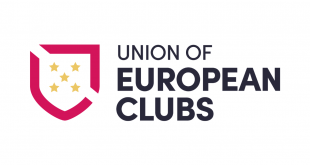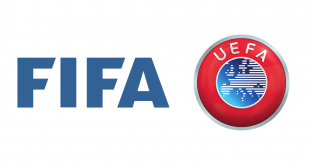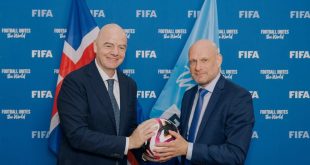 A conference in Nyon has offered UEFA, its member associations and various key stakeholders the opportunity to discuss the video assistant referee (VAR) system, reinforce networking regarding VAR implementation in Europe, and discuss best practice developments.
A conference in Nyon has offered UEFA, its member associations and various key stakeholders the opportunity to discuss the video assistant referee (VAR) system, reinforce networking regarding VAR implementation in Europe, and discuss best practice developments.
UEFA and its 55 member associations have been reinforcing dialogue in the refereeing sector – with the video assistant referee (VAR) system one of the key elements of the discussions.
A conference at the House of European Football in Nyon brought UEFA together with heads of referee departments and competitions from associations across the continent, representatives of the world football body FIFA and football’s lawmakers, the International Football Association Board (IFAB), and national VAR project managers, for an in-depth discussion on the latest developments concerning the VAR system, which UEFA has begun introducing in various European competitions.
Incorporated by IFAB into the Laws of the Game last year, the VAR system allows a video assistant referee (VAR) to review decisions made by the referee in certain key match situations with the use of video footage and a communication headset.
VAR was first introduced in a UEFA competition in the UEFA Champions League knockout phase this spring, and will be deployed in the competition as from this season’s playoffs. VAR is also set to be introduced in the UEFA Europa League in 2020/21. The system was used at this summer’s UEFA Nations League and European Under-21 Championship finals, and will also be deployed at next month’s UEFA Super Cup match, as well as at next year’s UEFA EURO 2020 finals.
The aim of the Nyon conference was to facilitate exchanges on VAR, encourage networking regarding VAR implementation in Europe, and to hear about the latest developments in best practices.
The chairman of the UEFA Referees Committee, Roberto Rosetti, explained the principles of VAR to the conference, as well as the process that led to the introduction of VAR by UEFA.
“We have received a lot of interest from associations concerning VAR,” Rosetti said, “and this conference is a way of coming together, sharing our experiences, and listening to the experiences of other countries.”
Rosetti explained the principles behind VAR. “The project is very useful for football because we need to protect football,” he said. He insisted that the objective of VAR was not to change football. “We want a situation where maximum benefit is derived with minimum interference. The referee remains in charge of decision-taking, but the VAR is available to intervene if so required.”
Rosetti emphasised the time and care needed to train and prepare referees to be video assistant referees. Last season, UEFA had trained a group of young officials from countries which had not introduced VAR, and was subsequently able to appoint them for the Under-21 finals in Italy.
“We will be able to use these referees in the coming season’s UEFA Champions League, and next season will see UEFA’s training programme continue, so that we can build more teams for matches in the UEFA Europa League in 2020/21.”
Rosetti explained that work would continue on improving the speed of communication between the video assistant referee and the referee on the field and enhancing the review process. “We believe that the crucial element is the VAR line of intervention – when an intervention is required for a situation. Work is ongoing to fine-tune that line, because the aim is not to have three or four interventions in every match. Obviously we’re happy when the referee makes the correct decision.”
“As far as the referee reviews are concerned, accuracy is important – but the amount of time involved is also crucial. The aim is to become quicker and more efficient.”
Representatives of some of the eleven European associations that had already implemented VAR – the Netherlands, Poland, Italy and Germany – presented important advice on their experiences in terms of management, financial investment, technical and technological preparation, and offered their counterparts in other associations every assistance within the knowledge-sharing process.
IFAB general secretary Lukas Brud gave invaluable advice to European associations on implementing VAR. “It’s a massive project that you can’t implement in a short period of time,” he stressed.
“It’s important that you understand the amount of time involved, and what is at stake, in terms of proper management and proper preparation. There’s a lot of hard work to do and requirements to fulfil before you receive approval from FIFA and IFAB to go ‘live’.
“You have to set up the appropriate infrastructures – what do we do? Who do we appoint? – look at the financial costs, train referees, make sure the technology is right. IFAB and FIFA, and also UEFA, through its own experiences. are ready to give you every help necessary on your path to official approval to implement the system.”
FIFA’s head of football technology and innovation, Johannes Holzmüller, provided key insights into, among others, minimum requirements for VAR operations, camera feeds and the referee review area. Holzmüller also spoke about VAR technology providers and their selection, referee communication systems and testing/assessment/approval procedures. He explained the various elements involved in a centralised VAR solution – operations at a central match centre – and a decentralised solution, involving operations at mobile centres at various venues.
Ahead of the conference, VAR was one of a number of topics discussed in Nyon as UEFA met the heads of refereeing from associations around Europe in a new departure as it steps up its dialogue with refereeing leaders in each member association.
“It is important that UEFA and the associations work together on the same page and speak the same language as far as refereeing is concerned,” said Rosetti. “So, after this first meeting, this kind of gathering will become a regular part of our activities.”
“It gave us the chance to present UEFA’s strategies, to hear feedback about refereeing and technical issues from across Europe, to review last season, and to look ahead to the coming period – for example, the pathway to UEFA EURO 2020 and the development of the next generation of top referees.”
The performance of the referees in the closing stages of the UEFA club competitions was also praised at the meeting. “No one spoke about their performances, to our satisfaction,” Rosetti said. “And no VAR intervention was needed in the semi-finals and finals – this is to the credit of the referees in those matches.”
 Arunava about Football A look at football & the world through my eyes!
Arunava about Football A look at football & the world through my eyes!



